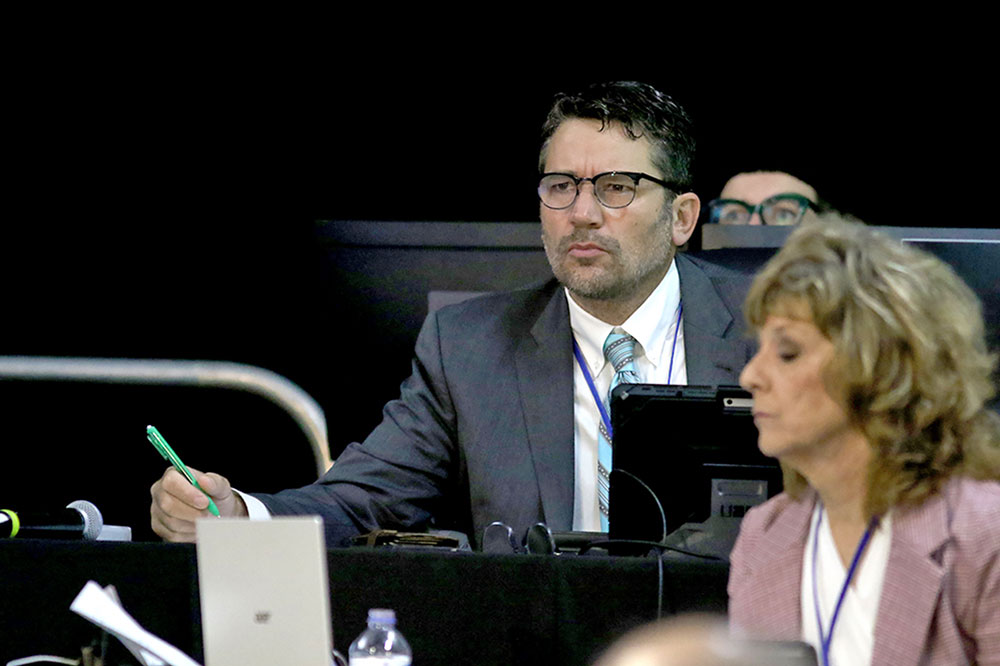McQuillen Place bankruptcy trustee wants to sell related lawsuits
By Bob Steenson, bsteenson@charlescitypress.com
The trustee in the McQuillen Place Co. bankruptcy procedure wants to “sell” three lawsuits and settle other legal matters that have been filed related to the bankruptcy case, raising some cash for the estate and effectively ending those lawsuits.
Opponents argue that the proposed agreement could impact the rights of other third parties, and that the selling price is too low.
A telephone hearing was held Friday morning in U.S. Bankruptcy Court for the Northern District of Iowa.
Charles Smith, a Council Bluffs attorney who was appointed the bankruptcy trustee, had filed a motion asking the bankruptcy judge to allow him to sell two lawsuits that had been filed by McQuillen Place Co LLC., the company that owned the assets of the McQuillen Place residential and commercial property on Charles City’s Main Street, against First Security Bank & Trust and three directors of the bank.
One of the lawsuits accused First Security Bank and Trust of Charles City of acting deceptively, unscrupulously and unethically in its dealings with McQuillen Place Co.; Charles Thomson, the originator of the project and primary equity holder; Amelia Management LLC, a property company of which Thomson is a principal; and Robert Thomson, Charles Thomson’s father who had guaranteed part of the construction mortgage on the project.
That suit, filed in November 2019, asked that the bank’s claims, including nearly $4 million in an unpaid construction mortgage, be dismissed because of the bank’s actions.
No significant action took place on the suit until July this year, when the bank filed a motion seeking to dismiss the suit, saying it included no factual allegations of fraud beyond speculation, and that other requirements of the suit had also not been met.
A similar lawsuit making many of the same claims had been filed against three First Security directors for tortious interference with a contract, and First Security had filed a motion to dismiss that suit as well.
The trustee is also seeking to sell counterclaims filed by McQuillen Place Co. LLC against a foreclosure action filed by the bank, and against Cedar Rapids Bank and Trust (CRBT), which was the original construction mortgage lender on the McQuillen project before First Security took over the loan.
As the trustee, Smith is responsible for all the assets of the McQuillen Place Co. estate in the Chapter 7 bankruptcy. The lawsuits, since they have the potential of benefiting the estate, are considered assets of the estate and are now under Smith’s control, with any actions needing approval by the bankruptcy court.
First Security has offered to pay $40,000 for the lawsuits against it, and has agreed to reduce its claim against the estate to $1.5 million, instead of a potential $4 million.
CRBT has offered $20,000 to buy the suit filed against it.
“All four of these claims have a significant risk of loss for the estate,” Smith said during the hearing Friday morning.
If the motions filed by First Security to dismiss the cases, and a motion filed by CRBT for summary judgment are granted, the estate will get nothing, he said.
Selling the suits also avoids the delay and potential cost of litigating the cases, he said, noting the trial in the CRBT case isn’t scheduled until March 2022, and disclosure statements show the lawsuits against First Security could potentially take five years.
“So in addition to the certainty of receiving $60,000, these sales will avoid the tremendous cost of delay in getting the matter closed,” Smith said. “I’m just trying to get the bankruptcy case wrapped up. One of the two appeals to the Circuit Court has now been dismissed, and it’s my believe that the other will ultimately result in affirming this court’s order approving the sale of the building.”
Peter Riley is a Cedar Rapids attorney representing Charles Thomson; Amelia Management; Cornice & Rose International, the Illinois company that provided architectural work and construction work for the McQuillen Place project and which received a 40% equity stake in the project for its services; and James Gray, founder and president of Cornice & Rose.
Riley said his primary concern with Smith’s proposal is that it seems to “preclude a broad range of litigation that has been or may be brought by non-debtor third parties.”
The trustee shouldn’t care if other parties sue the bank or the bank officers, Riley said. “That’s not his fight. All he wants is money for the estate” to pay creditors.
Smith said an injunction against other claims is a provision that the bank wanted as part of the agreement on the sale of the lawsuits.
“They made the argument that they don’t want to settle with me and then turn around and have the same issues raised by somebody else. They only want to have to pay for the claim once, not several times,” Smith said.
Thomson argued that the lawsuits are being sold for much less than they are potentially worth.
If the suits are argued by a contingency fee attorney there is no risk to the estate and “the potential return to the estate on this is huge,” Thomson said.
Thomson has estimated in some court documents that success in the suits against the bank could be worth as much as $7 million if they are successful.
“I think everyone on our side wants as prompt a resolution as possible to get the building finished as soon as possible, but we want it to happen without bulldozing over people’s rights,” Thomson said. “We think our rights are legitimate, otherwise we wouldn’t have asserted them.”
Eric Lam, a Cedar Rapids attorney representing First Security, suggested that he and Riley get together to come up with language that would satisfy Riley regarding third-party claims and that would satisfy Lam regarding protecting the bank.
He said they would have an agreement to present to the judge by noon Tuesday, or if they couldn’t agree then each one could present his proposal and the judge could decide.
Also as part of the proceeding, there were no objections to the proposal that the CRBT suit be sold to that bank for $20,000, so Judge Thad Collins approved that motion.
Also, another creditor of the McQuillen Place Co. bankruptcy estate filed a motion supporting the objection to the sale.
Pederson Plumbing & Heating, an unsecured creditor, argued in its motion that it realized that litigating the various claims against First Security and “related persons and parties” may take a considerable length of time, with an uncertain outcome, but “the possible enhancement of the estate through a successful outcome is worth the time and risk involved in the litigation.”
Pederson also said it “believes the settlement proceeds contemplated under the trustee’s motions are inadequate under the circumstances.”








Social Share